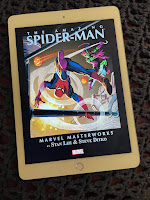
Tied In: The Business, History and Craft of Media Tie-In Writing features entertaining, informative essays by writers who regularly produce media tie-in books... you know, those books (often paperbacks, but increasingly appearing in hardback form, too) that adapt blockbuster movies and fan-favorite television series, as well as present original stories featuring the characters from those sources. I used to read a lot of these in my high school and college days, and- recognizing that a good book can come from anywhere- still pick one up here and there.
The contributing writers discuss the fun and challenge of producung these works, and their various approaches to the job. Some, for example, have great respect for a character's dialogue as conceived for the original movie or TV show they're adapting, and don't change it in their written version (aside from adding new dialogue to get their tale up to proper book length). Others happily change dialogue at will, believing that the visual and literary mediums have different needs, and what sounds good in a movie might not work in a book. All very interesting stuff.
There seems to be one area of agreement among the writers, however: that those working in the tie-in arena should have a passion for their material but not be outright in love with it. This is because the characters being written about- whether they're from Star Trek, CSI, Bones, Star Wars, Murder, She Wrote, or any of the many other entertainment properties that regularly generate tie-in books- don't belong to the writer producing the tie-in book, and the publisher and licensor (usually a studio) can weigh in at will and make the writer change things. And usually do.
The advice here for potential tie-in writers is to try to see that inevitable outside input as more of an opportunity to deliver the best book possible than as creativity-killing interference. Getting too attached to the material, though, is a definite no-no, as tie-in writers will eventually be given marching orders they won't want to follow. My favorite example of this is when Max Allan Collins relates in his essay that he was told not to reveal the identity of the mystery villain in his adaptation of the movie Dick Tracy, because the movie producers wanted the film's big reveal at the end to remain secret. So he had to essentially write a mystery novel without solving the mystery!
Other pleasures of the book include an entertaining look at tie-in books of the 1960s (a kind of golden age of the form), which also doubles as a tribute to the highly-regarded I Spy tie-in books written by Walter Wager; and a long interview with Raymond Benson, who discusses what it was like to write several James Bond continuation novels in the 1990s.
Quibbles are small. A few essays could have been a little shorter and a few cried out for more length and detail. And someone should have corrected the fair amount of typos, dropped words, and other technical glitches. On that last point, I'm guessing that tie-in writers are very busy people and that many of the contributors quickly finished up their essays to make deadline, without giving them a final proofing, and that editor Lee Goldberg may have been equally busy with his own tie-in work to do a detailed proofing, too. In any event, the errors (enough to be annoying, but not so numerous to cause me to not recommend the book) can be immediately fixed for the e-book edition of Tied In (the version I read) if someone puts his or her mind to it. Maybe they've already been noticed and fixed by the time you read this.
With its twenty or so breezy, engaging essays, Tied In nicely illuminates an under-discussed part of the literary landscape and also reminds writers of a potentially interesting area in which to toil. It was a worthwhile project and I'm glad it was undertaken.
Tied In is available for $2.99 on Kindle, a huge savings over Amazon's $14.99 price for the print version of the book.



Thanks for the great review. I hope most of the typos and dropped words have been caught since the version you read. I know we've updated the files several times over the last few months to make corrections. If not, readers can alert me to the errors and they will be taken care of.
ReplyDeleteLee